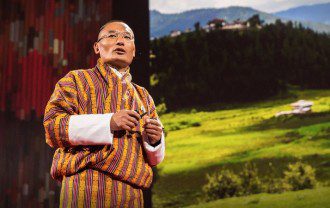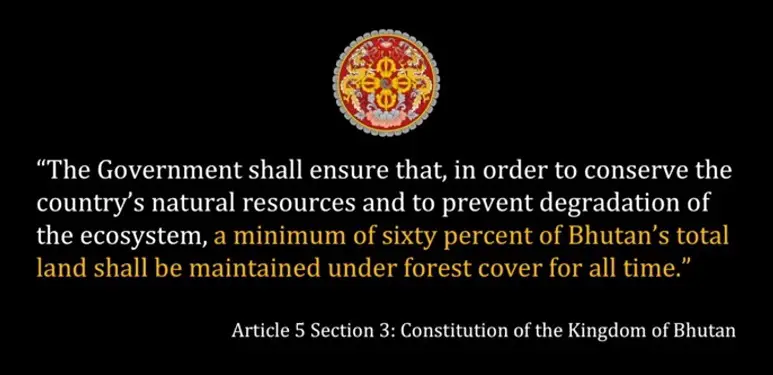Contributing writer for Wake Up World
“If the Government cannot create happiness for its people, there is no purpose for the Government to exist.” ~Legal code of Bhutan, 1729
Lodged between two of the most populated countries on earth — India and China — Bhutan may be small at 700,000 souls, but it has a mighty role to play in showing the world how to preserve the environment, while also cultivating happiness in its human population. In fact, the Bhutanese believe that nature and happiness go hand in hand, that it’s impossible to have one without the other.
“Preserve our natural rich heritage do not pollute the surroundings. Remember nature is the source of all happiness.” ~ Drukgyel HSS
[pro_ad_display_adzone id=”110028″]
One way Bhutan is protecting its natural surroundings is by taking “carbon neutral” up a notch to “carbon negative” — where the country absorbs three times more CO2 emissions than the population generates, mainly through hydropower and the protection of its forests. Since last year, the country is a designated “carbon sink,” where it stores more carbon than it emits. Moreover, the constitution itself demands that a minimum of 60 percent of Bhutan’s total land remain under forest cover for all time. It’s currently at 72 percent. As we know, maintaining forested land is an important component of supporting the environment and buffering the effects of climate change. Instead of narrowly focusing on Gross National Product — and logging their forests to no end for short-term gains — Bhutan has chosen a path less traveled. And are happier for it.
Bhutanese Prime Minister sets the record straight about the realities of climate change
“My country and my people have done nothing to contribute to global warming, but we are already bearing the brunt of its consequences.” ~ Tshering Tobgay, Bhutanese Prime Minister
Bhutan has good reason to want to curb global warming. Beyond the sheer pristine beauty of their natural environment — and desiring to protect it for generations to come — Bhutan has already seen the devastating effects climatic changes have had on the country. Glaciers melting and creating lakes that, while stunning, pose a very real threat of flash flooding — which is exactly what happened a few years ago, wreaking havoc on the valley below when the dams were breached. Considering Bhutan has 2,700 similar glacial lakes to contend with, the ramifications of global warming are daunting for this tiny Himalayan country.
Says Thinley Namgyel, Bhutan’s chief negotiator at COP 21:
“People are already noticing the temperature changes. High mountains which should be closed for months are now open year-round. Monsoon rains are not arriving on time, and then appearing when we don’t need them, destroying crops.”
And Richard Black, director for the Energy and Climate Intelligence Unit (ECIU) adds:
“As a small state high in the Himalayas, Bhutan faces disruption to water supplies, extreme weather and impacts on ecosystems as a result of changes to the climate, so it is in their interests to address the problem both domestically and through the UN climate process.”
But no one, up until this point, has been listening.
Back in 2009 during the United Nations Climate Change Conference, or COP 15, in Copenhagen, Bhutan first made the promise to remain carbon neutral. “Governments were so busy arguing with one another and blaming each other for causing climate change, that when a small country raised our hands and announced, “We promise to remain carbon neutral for all time,” nobody heard us. Nobody cared,” said Tobgay.
Fortunately, a renewed promise made at the COP 21 in Paris fared better. Governments agreed on the realities of climate change and were willing to work together in order to reduce greenhouse gas emissions. Finally Bhutan was heard and noticed — even recognized as a good example of how to solve the looming problem of global warming. Things are looking up. Nonetheless, there’s still a long way to go. But Bhutan is making major strides. Here’s how.
Multi-pronged approach to cooling global warming
Not only is the country preserving forests to help the environment — and investing in low-pollution energy sources like hydropower — but it’s also taking steps to combat the regional growth of gasoline-powered cars by imposing strong automobile taxes, implementing a public transit system and encouraging a greater use of electric vehicles through subsidizing their purchase. The Prime Minister hopes to eventually convert all the country’s vehicles to electric power. Similarly, Bhutan subsidizes the cost of LED lights and the government is in the process of going completely paperless. In addition, free electricity is provided to rural farmers, which helps to reduce the use of firewood for cooking food. By 2030, Bhutan plans to be zero-waste and achieve net zero greenhouse gas emissions. And the country’s food supply will be 100% organic by 2020.
We then come full circle to the focus on trees. Through the national programs Clean Bhutan and Green Bhutan, trees are being planted across the country. A ban on export logging is also in place. In June 2015, a world record was made by a team of 100 volunteers for planting 49,672 trees within an hour. The following March, in celebration of the birth of the first child of King Khesar and Queen Jetson, each household in the nation — 82,000 to be exact — planted a tree, while an additional 26,000 were planted in various areas around the country, bringing the total up to 108,000.
All and all, Bhutan is proving itself to be a leader of innovative solutions for the challenges we face regarding climate change. Let’s hope larger, more influential nations will follow suit in the not so distant future.
This country isn’t just carbon neutral — it’s carbon negative
Article sources
- www.theguardian.com/environment/2015/dec/03/bhutan-has-most-ambitious-pledge-at-paris-climate-summit
- www.ecowatch.com/2015/09/28/bhutan-organic-zero-waste/
- www.santacruzsentinel.com/article/NE/20151022/FEATURES/151029903
About the author:
 Carolanne Wright enthusiastically believes if we want to see change in the world, we need to be the change. As a nutritionist, natural foods chef and wellness coach, Carolanne has encouraged others to embrace a healthy lifestyle of organic living, gratefulness and joyful orientation for over 13 years.
Carolanne Wright enthusiastically believes if we want to see change in the world, we need to be the change. As a nutritionist, natural foods chef and wellness coach, Carolanne has encouraged others to embrace a healthy lifestyle of organic living, gratefulness and joyful orientation for over 13 years.
Through her website Thrive-Living.net, she looks forward to connecting with other like-minded people from around the world who share a similar vision. You can also follow Carolanne on Facebook, Twitter and Pinterest.
Further reading from Carolanne Wright:
- Don’t Ask, Just Plant — Taking Back Our Food Sovereignty with Guerrilla Gardening
- Plastic Waste in the Ocean Will Outnumber Fish by 2050
- Seed Bombs: A Creative (and Fun) Mission to Save the Bees and Butterflies
- Mind Control, Subliminal Messages and the Brainwashing of America
- Autistic Boy with Higher IQ Than Einstein Discovers Gift After Removal from State-Run Therapy
- Monsanto Charged with Crimes Against Nature and Humanity – Set to Stand Trial in 2016
- Dr Sebi: The Man Who Cures Aids, Cancer, Diabetes and More
- Politicians in California May Soon be Forced to Wear Corporate Sponsor Patches Like Nascar Drivers
- Plastic-Eating Mushroom Discovered in the Amazon Rainforest — A Solution for Our Trash Saturated World?
- Big Pharma and Organized Crime — They are More Similar Than You May Think
- Over 100 Scientific Studies Agree: Cannabis Annihilates Cancer
- Emotional Energetic Healing: The Future of Medicine is Here
- Why Every Parent Should Consider Unschooling
- The Greenhouse of the Future: Grow Your Own Food Year-Round With This Revolutionary System
- First U.S. City Produces More Electricity Than It Uses — With 100% Renewable Technology
[pro_ad_display_adzone id=”110027″]








